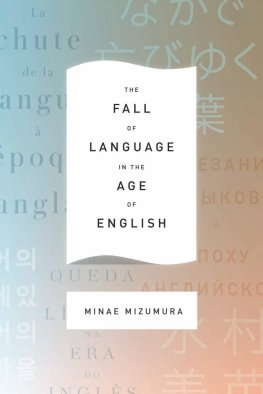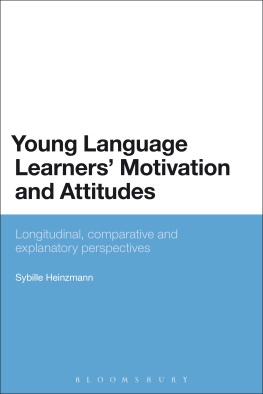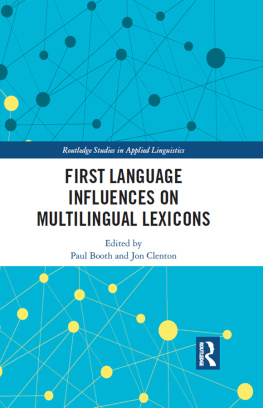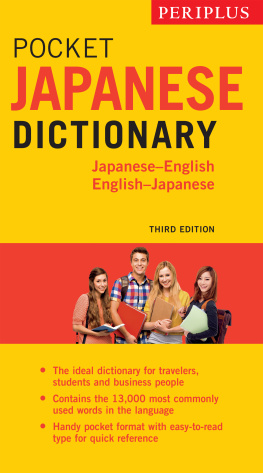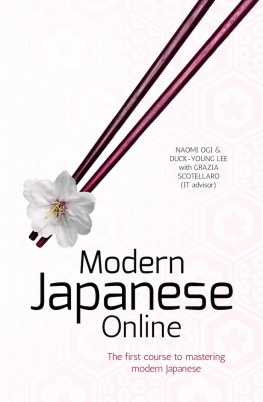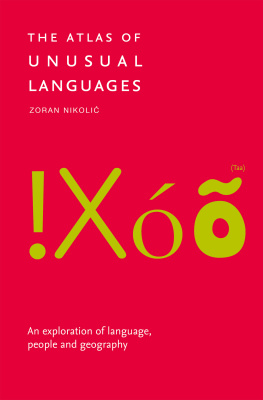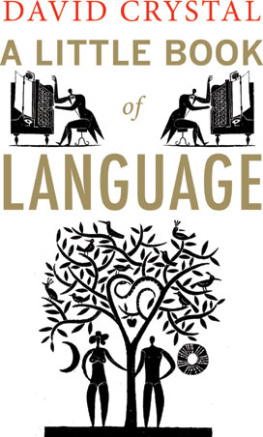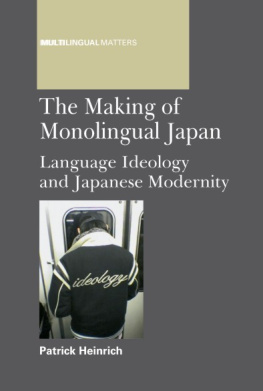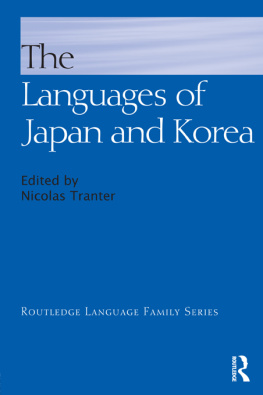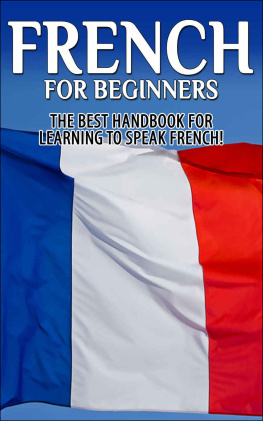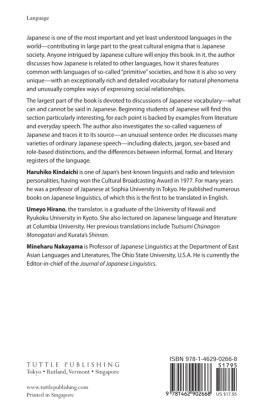THE FALL OF LANGUAGE IN THE AGE OF ENGLISH
THE FALL OF LANGUAGE IN THE AGE OF ENGLISH
MINAE MIZUMURA
TRANSLATED BY MARI YOSHIHARA AND JULIET WINTERS CARPENTER
COLUMBIA UNIVERSITY PRESS
New York

COLUMBIA UNIVERSITY PRESS
Publishers Since 1893
NEW YORK CHICHESTER, WEST SUSSEX
cup.columbia.edu
Nihongo ga horobiru toki: Eigo no seiki no naka de Copyright 2008 by Minae Mizumura First published in Japan in 2008 by Chikumashobo Ltd., Tokyo English-language translation rights arranged with Chikumashobo Ltd., Tokyo, through JapanForeign Rights Centre English-language translation copyright 2015 Columbia University Press
All rights reserved
Library of Congress Cataloging-in-Publication Data
Mizumura, Minae
[Nihongo ga horobiru toki. English]
The fall of language in the age of English / Minae Mizumura ; Translated by Mari Yoshihara and Juliet Winters Carpenter.
p. cm.
First published in Japan in 2008 by Chikumashobo Ltd., Tokyo. entitled Nihongo ga horobiru toki: Eigo no seiki no naka de.
Includes bibliographical references and index.
ISBN 978-0-231-16302-6 (cloth : alk. paper)
ISBN 978-0-231-53854-1 (e-book)
1. Japanese languageSocial aspects. 2. English languageInfluence on Japan. I. Yoshihara, Mari, 1968translator. II. Carpenter, Juliet Winters, translator. III. Title.
PL523.5.M5813 2015
495.609'051dc23
A Columbia University Press E-book.
CUP would be pleased to hear about your reading experience with this e-book at .
Cover design: Evan Gaffney
References to websites (URLs) were accurate at the time of writing. Neither the author nor Columbia University Press is responsible for URLs that may have expired or changed since the manuscript was prepared.
PUBLICATION OF THE ENGLISH EDITION IS SUPPORTED BY A GRANT FROM FIGURE FOUNDATION
CONTENTS
The dominance of English is a subject often discussed in the mass media and by scholars in the West. When Professor Mari Yoshihara approached me with the idea of rendering this book into English, I was simply thankful and did not envision the difficulty that would be involved. I flattered myself in thinking that the book might contribute to the ongoing debate by adding a theoretical and historical perspective that has not been sufficiently explored. I also hoped the book would help readers become acquainted, however tangentially, with a magical written language only a few of them are likely ever to know.
Naturally some adjustments were expected from the start. Written for the general reader in Japan, the book is overflowing with concepts, proper nouns, and historical facts that would mean little to readers unfamiliar with that country. A straightforward translation would end up appealing only to Japanese specialists, who can always read the book in the original if they so wish. I wanted to make the book open to a wider readership, realizing that once the translation came out, my ideas could reach not just readers in the English-speaking world but readers everywhere in this age of English. Professor Juliet Winters Carpenter agreed to collaborate with me in revising the book for this purpose, adding explanations here, shortening or eliminating there, and recasting the discussion as necessary for a new readership.
The true nature of the challenge became apparent to me only after she and I set to work. The books original title, rendered in English, was When the Japanese Language Falls: In the Age of English. That title was changed for the translation, but even so the thread running throughout the work is , where I declare that, rude though it may sound, I find much of contemporary Japanese literature just juvenile. In the original, I then conclude with the following words, which have been deleted from the translation because they are specifically addressed to Japanese readers:
This book was written for those who, in moments of solitude, quietly worry about the future of Japanese literature and the Japanese language. It is for those who think that what is being written in Japanese today is ultimately of little relevance but who wish, with mingled despair and resignation, that at the very least more people would read Japanese literature written in those years when it was deserving of the name.
I limited prospective readers of the original to those sharing my sense of crisis, thereby freeing myself from the need to justify my ungracious claim about contemporary Japanese literature. The sentiment that the Japanese language is falling is in fact so widely shared by lovers of modern Japanese literature that it seemed to me to require no explanation.
The problem is that this sentiment will not be evident tocannot possibly be grasped byanyone reading this book in translation. For readers unfamiliar with Japan, my distress is likely to sound no different from the lament voiced by those involved with literature and the humanities the world over; the lament of librarians, schoolteachers, and middle-class parents; the lament that such people have always made and that now in the age of the Internet has only increased in harping intensity: Young people dont read real literature!
Yet I would say that as a Japanese observing the folly of her country, my frustration is of a different orderit borders on disbelief. But little of this sentiment, I fear, can easily be understood by readers of this book in translation.
Worse, because the book is founded on that frustration of mine, it may end up sounding overly patriotic. Every ethnic group cherishes its language and takes pride in its literature. Some readers may protest that this book gives pride of place to Japanese, which is merely one language among many, and trumpets the brilliance of modern Japanese literature, which is merely one literature among many. But my aim is not to congratulate my fellow Japanese for whatever our ancestors may have accomplished. The important point to remember is that Japanese is a non-Western language, and the first blossoming of Japanese modern literature, written in this non-Western language, took place some century and a half ago after a long and tortuous course dating back to the seventh century, when the country first acquired a written language. I wanted Japanese readers to understand how truly miraculous that blossoming was, to have them see what a treasure we share, and to make the case that we are now on the verge of letting that treasure slip through our fingers.
I attempted at first to use this preface to the English translation to explain my dismay and frustration but soon abandoned the attempt. Explaining would have required me to go into considerable detail, taking up many pages and taxing the readers patience. Instead, I decided to substantially rewrite the to describe the current linguistic and cultural mess we Japanese find ourselves in and to sketch in terms relevant to foreign readers how we might yet escape from it.
When Mari Yoshihara volunteered to translate the book into English, I assumed that it would be years before anything happened, knowing how busy she is with her other work. But to my astonishment, she finished the first six chapters in just six months. I myself, slowed in part by fragile health, took six years to write the book, so her quickness floored me. Then, in the blink of an eye, she found me a distinguished publisher: Columbia University Press. Her power of action, and her total commitment to seeing the book into print, far exceeded my expectations. I was tied up with other projects, however, and unable to begin revising the manuscript for English readers right away. Once I got started, as mentioned, I sought the assistance of Juliet Winters Carpenter, who had just recently rendered my novel
Next page

